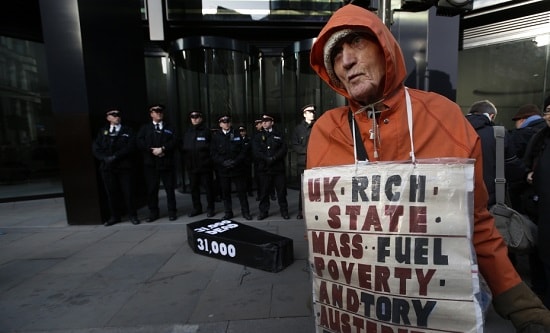
On Wednesday 13 March, Chancellor of the Exchequer Philip Hammond gave his Spring Statement, a biannual update on government revenues, spending and fiscal policy. Mark Twain once commented that there are three kinds of lies: ‘lies, damned lies and statistics.’ The latter are used deliberately to ‘beguile’, confuse and obfuscate the truth. Hammond’s Spring Statement is an exercise in ‘lies, damned lies, and statistics’, in which he painted a picture of a completely imaginary British economy which is ‘working for all.’
One of Hammond’s boasts was the ‘fastest wage growth in over a decade.’ This is technically true. Between August-October 2017 and August-October 2018, average pay nominally grew 3.3%: the fastest growth since 2008. However, adjusted for inflation, real-terms wage growth in this period was a much more limited 1%. More importantly, this 1% growth followed sustained wage stagnation during the previous decade, including almost six years of falling wages. Real wages are still lower today than they were in 2008. This is leaving aside the question of where in the income-scale wage growth is actually situated: at the top. Record-levels of household borrowing have been necessary for many to soften reductions in living standards. This, however, has resulted in 6.5 million households in some form of debt distress, according to the Resolution Foundation. Hammond’s boast about the ‘fastest wage growth in over a decade’ is not precisely a lie, nor a damned lie, but it is a dishonest statistic.
Another Twain statistic
During his speech, Hammond made a lot of noise about the Office for Budget Responsibility (OBR) report released the same day, calling it ‘another step on Britain’s road out of austerity.’ Citing the report’s predictions, Hammond stated that despite slowing growth in the world economy, Britain’s economy will continue to grow in every year in the OBR forecast, and will do so at a faster rate that Germany. Superficially, this sounds impressive, but at bottom it is just another of Twain’s statistics: as the Shadow Chancellor John McDonnell pointed out in his response to Hammond’s speech, the OBR’s 1.2% growth forecast for the next year is in fact a downgrade from its earlier prediction of 1.6%. Chris Giles, the economics editor at the Financial Times commented on 14 March that 1.2% growth is ‘a pretty low figure for the UK: about as bad as it’s been at any time since the financial crisis.’ The best that Giles could say of the 1.6% growth forecast by the OBR in the best of subsequent years was that it is ‘not a disaster.’
On the deficit, Hammond boasted that government borrowing would be 1.1% of GDP in 2018/19, £3bn lower than forecast at the Autumn Budget. The OBR, however, argued that the figures used by Hammond contain ‘fiscal illusions’ relating to student loans. Because most of these loans will in fact be written off as graduates find themselves earning below the repayment threshold, the OBR predicts that when the Office for National Statistics accounts for the expected costs upfront, government borrowing will rise £10-13bn per year. OBR chairman Robert Chote concluded that ‘The government does not appear to be on course to achieve [its fiscal objective of eliminating the deficit] on current policy’.
Austerity’s appalling impact
As the Financial Times pointed out on 14 March, ‘This financial year, all the gains in receipts come from higher than expected income tax and national insurance, largely because the incomes of those with the highest pay are growing faster than the average.’ For everyone else, the real meaning behind the reduction in the deficit was spelled out in all its stark reality by Shadow Chancellor John McDonnell in his response to Hammond:
- 87 people die every day before they receive the social care they need
- Benefits freezes and the roll out of universal credit are forcing people into foodbanks to survive
- One million pensioners are living in severe poverty
- A male child born in Kensington, Liverpool can expect to live 18 years less than a child born in Kensington and Chelsea
- Over 2.5 million people are working below 15 hours a week; 3.8 million people are in insecure work; and average weekly wages are still below the level of ten years ago
- Four and a half million children are living in poverty, nearly two thirds in a house where someone is in work
- Youth unemployment is 7% above the national average. 26% of young black people and 23% of young Bangladeshi British people are unemployed.
- The income of single mothers has fallen 18% since 2010.
As McDonnell put it, Hammond ‘has not eliminated the deficit. He has simply shifted it onto the shoulders of head teachers, NHS managers, local councillors, police commissioners and worst of all, onto the backs of many of the poorest in our society.’
Hammond painted an imaginary picture of dizzying progress and soaring living standards thanks to the good economic management of a Conservative government which, in 2010, inherited a recession caused by the Labour Party. All one has to do is scratch the surface to find that Hammond is either lying or he is ‘beguiling’ us with carefully chosen statistics. The pain, suffering, misery, and death inflicted by austerity over the last ten years does not figure.
Hammond, of course, has little to fear in so brazenly lying. The Spring Statement was overshadowed by Brexit proceedings, as the following parliamentary session would vote on ruling out the possibility of leaving the European Union without a deal. Hammond referred to a ‘cloud of uncertainty’ hanging over the British economy, but promised a ‘double deal dividend’ with the end of uncertainty for investors and the release of the ‘fiscal headroom’ of government revenues built up by Hammond, if MPs backed the Prime Minister’s Brexit deal. Such fanciful promises, detached from the reality of the crisis faced by British capitalism, are typical of Hammond: yet more lies, damned lies, and statistics.
Seamus Padraic




